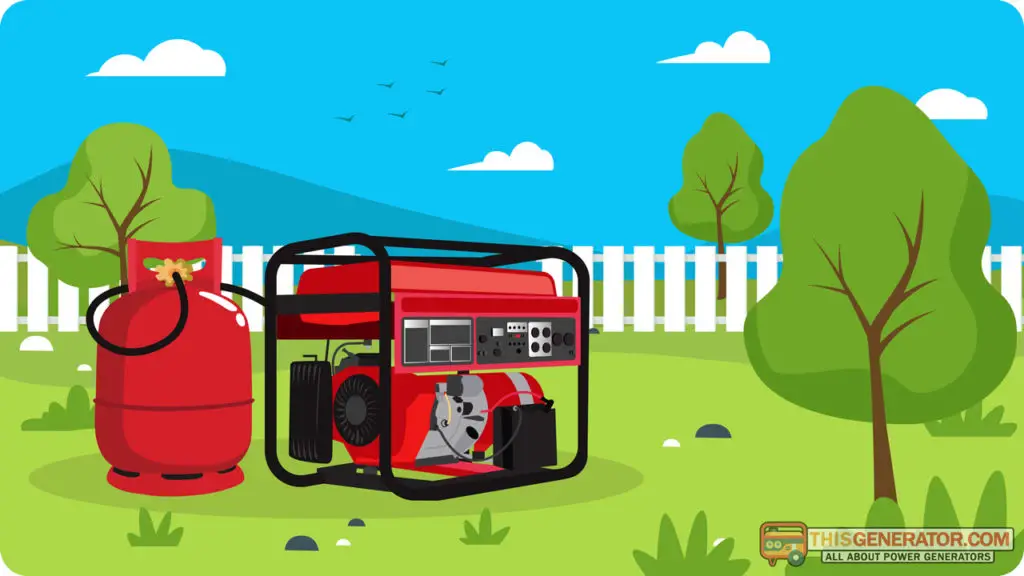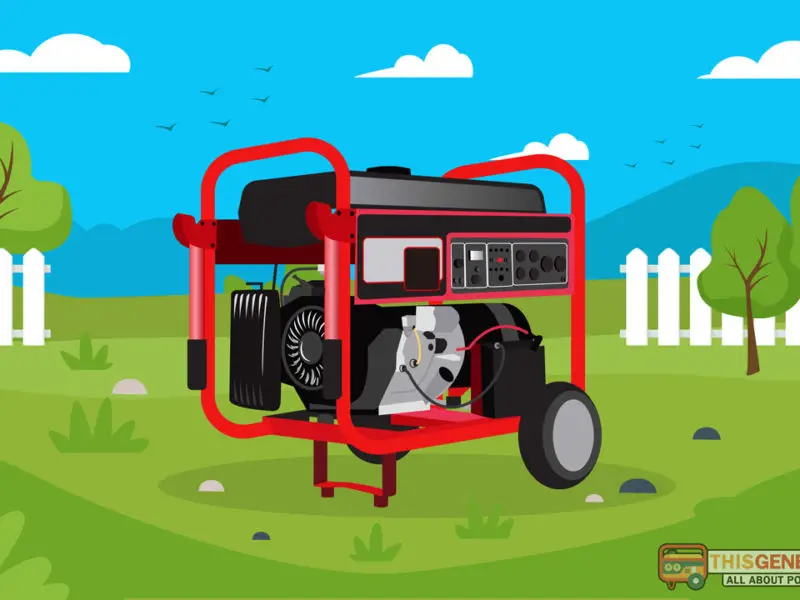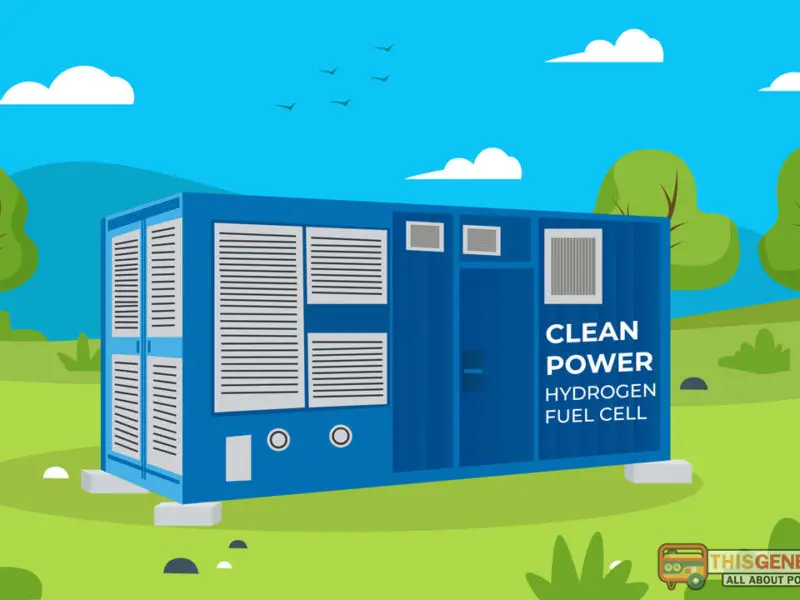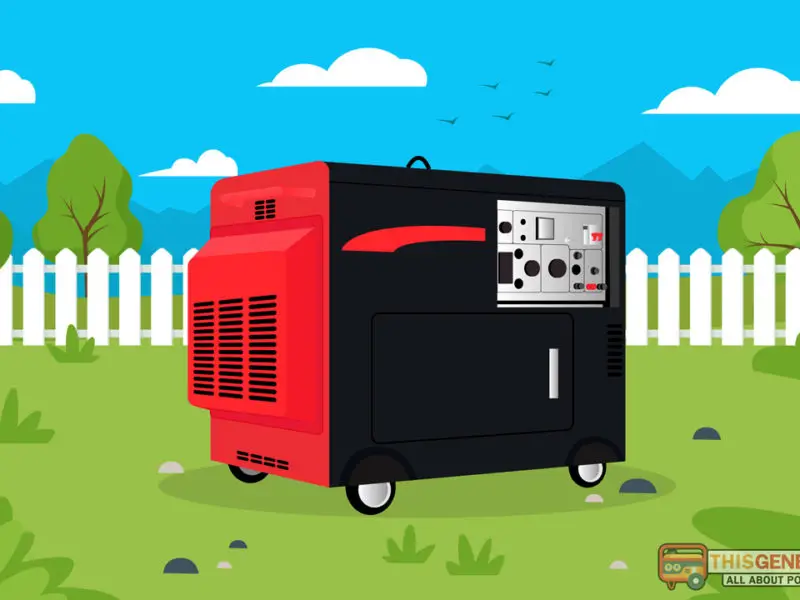So, you’ve decided to buy a new generator. Maybe you’ve found a new hobby in traveling and need a portable generator for camping. Or perhaps your standby generator is losing its power, so you feel it’s the right time to bring in a replacement.

Unfortunately, you still can’t decide the best type of fuel. You’re leaning towards natural gas generators but aren’t entirely sold yet.
Are natural gas generators a good choice? Are they powerful enough? Or will you regret the choice a few weeks down the line? We answer these and many other questions on natural gas generators in this guide.
What are Natural Gas Generators?
As the name suggests, natural gas generators run on natural gas to generate electricity. This is different from other units that run on propane, gasoline, etc.
They work exactly like other fossil fuel-powered generators, including propane and gasoline generators. However, they exclusively use natural gas unless you opt for a bi-fuel model. Bi-fuel generators run on one of two pre-selected fuels. For instance, it can run on propane or natural gas.
How Do Natural Gas Generators Work?
The working principle behind generators is the same regardless of the fuel. An internal combustion engine injects a mixture of fuel and air into a combustion chamber. Within the chamber is a piston designed to compress the mixture.
Compressing a mixture of fuel and air typically causes a spark plug inside the fuel to ignite. After ignition, the combustion chamber burns the fuel (natural gas in this case), producing heat energy.
The heat energy is harnessed to drive down pistons within the engine. The piston movement, in turn, helps turn the crankshaft, which turns the generator’s rotor.
The rotor (a moving component) works alongside the stator (a stationary component). Together, the two parts form the alternator, arguably the most important part of the generator besides the engine. This explains why it’s also known as the generator head. Turning the rotor creates an electromagnetic field that effectively turns the mechanical energy from the engine into electrical energy.
The alternator harnesses electrons in the electromagnetic field and directs them through wires, creating a continuous flow known as an electric current. This current is “cleaned” and stabilized severally, then sent out to the control panel’s output sections, where it’s made available to home devices and appliances.
Common Types of Natural Gas Generators
Although many generators can run on natural gas, the two main generator types that commonly operate on natural gas are;
1. Standby generators
Standby generators are permanently installed power systems designed to swing into action within seconds of a power outage or interruption. The name “standby” actually means that the generators stand at the ready in case of grid power interruption.
Modern standby generators incorporate an automatic transfer switch (ATS) that automatically senses power outages or supply interruption and engages the generator to provide backup power. They serve the entire home.
Natural gas makes an excellent fuel choice here because natural gas lines rarely run out of supply. Also, natural gas lines guarantee continuous fuel supply without the need to refill the tank, as is with propane-fueled units.
2. Prime generators
Prime generators are designed for scenarios where there’s no local utility. Unlike standby and backup units that step in when local supply is interrupted, prime generators are the sole source of power where they’re installed.
As such, prime generators can run for much longer without the need to cool down. They can also handle larger loads than backup generators.
Prime generators are almost similar to continuous generators. Both are designed to run for a long period without the need for “cooling” breaks. The only difference is that continuous generators can run for extended periods with a constant load, while prime generators run on variable loads.
Pros and Cons
Natural gas generators are incredibly popular among homeowners. Indeed, some studies show that they’re the most common among standby generators. According to EIA, natural gas accounts for nearly 43% of all generator capacity in the US.
Natural Gas Generator Advantages
The following are some of the leading benefits of natural gas generators compared to diesel, propane, and gasoline models.
- Storage efficiency
One of the first things that come to mind when one thinks of natural gas generators is the gas lines. Unlike the other three fossil fuel options that require cans and other storage mechanisms, natural gas arrives in underground pipes, thus doesn’t require dedicated storage.
- No need to refill
Almost related to storage is the need to replenish fuel cans and tanks. For instance, if working with a propane heater, you need to have a large tank or several smaller cans. Whichever the case, the container needs refilling when it runs empty. Natural gas provides a constant supply of fuel without the need for cylinder/tank refills.
- Easy to use
Although nearly all fossil fuel generators are pretty straightforward to use, natural gas is a little more user-friendly. For one, options such as diesel create “wet stacking” issues that can cause the engine to run below the desired operating temperature. Diesel may also solidify and grow fungus if stored for long periods.
- Natural gas is affordable
Natural gas is the cheapest of all fossil fuels. Although it’s still multiple times more expensive than electricity, it’s cheaper than diesel, propane, gasoline, and even ethanol. The Alternative Fuels Data Center (AFDC) shows that natural gas currently costs around $2.22/GCE. Meanwhile, propane costs $2.98/gallon, gasoline costs $3.09/gallon, and diesel costs $3.26/gallon.
- It’s the most environmentally friendly
All fossil fuels generate emissions, which are bad for the environment. However, natural gas emits the least exhaust products. Meanwhile, diesel is particularly notorious for significant greenhouse emissions, including carbon dioxide and carbon dioxide, followed by gasoline.
Natural Gas Generator Disadvantages
Despite the many advantages, natural gas generators aren’t without downsides. The following are some of the disadvantages;
- Safety issues
This is arguably the biggest downside to natural gas generators. Although it’s a great fuel and very convenient too, natural gas lines are a massive safety risk. For one, natural gas is highly flammable. Moreover, the lines can become compromised for many reasons, including natural incidents such as earthquakes. Combine the two, and you have a significant safety hazard
- Relatively low power output
Finally, natural gas isn’t the most potent power source. Although it burns cleanly, producing very little waste, it generates relatively lower heat quantities than diesel and propane. That’s why anyone looking for raw power will overlook natural gas for propane or even diesel.
Sizing a Natural Gas Generator
Whether you’re shopping for a natural gas generator for your small business or a standby power source for your home, sizing is critical. Fortunately, sizing a natural gas generator isn’t any different than sizing any other fossil fuel generator.
You should always try to find the right size generator for your application because oversizing or under-sizing generators can be costly.
An oversize generator presents the following challenges;
- It may trip the circuit breaker
- It may damage connected equipment
- Intermittent, poor performance
- Power wastage
Meanwhile, an undersized generator presents the following issues;
- Lack of sufficient power to run your appliances
- The generator may run too long and too hard (overworking)
- Overworking can accelerate wear and tear and cause damages
To find the right size generator for your application, begin by assessing your needs. Ask why you’re purchasing the generator in the first place. Where do you intend to use it? Are you buying a backup unit in case of a blackout? Are you purchasing a portable unit for camping or fishing? Or are you interested in a standby whole-house generator?
Once you’ve identified the targeted application, calculate how much power you need at maximum capacity, i.e., when all the intended appliances and devices are plugged on. Then find out the starting wattage for each appliance too.
We recommend creating a list with three columns. In the first column, list all the appliances/devices. In the second, note down the corresponding running wattage. Then, in column three, note down the starting wattage.
To find out how much power you need, add the values in each column to find the total required running wattage and total required starting wattage. Then, add the two to find how many watts you need from the generator you eventually purchase.
Typically, you’ll need a small unit in the 1,000-watt-3,000-watt range for a portable adventure/event generator. Meanwhile, the ideal backup generator is around 6,000 watts to 10,000 watts. However, if you’re shopping for a standby generator for the whole house, you need at least 9,000 watts and up to 25,000 watts, depending on the size of the house and the number and sizes of your appliances.
Summary
As you can see, natural gas generators are one of the many options when shopping for a power generator. And they come with many advantages, including affordability, ease of use, and unmatched convenience.
Whether you’re in the market for a portable, backup, or whole-home generator, it’s an option you should strongly consider.



